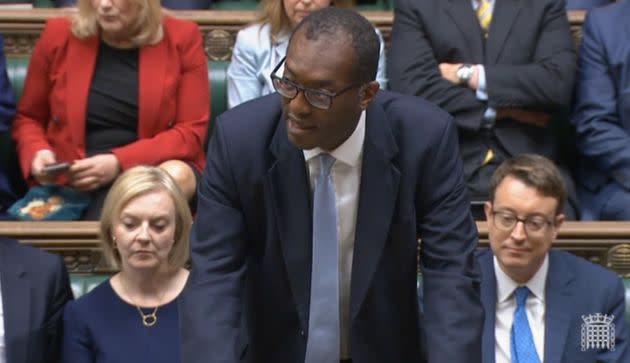Kwasi Kwarteng Slashes Income Tax For Highest Earners In Mini Budget

Chancellor Kwasi Kwarteng (Photo: Parliament TV)
Kwasi Kwarteng has announced a surprise slash on income tax for the country’s highest earners.
The new chancellor revealed that the 45 per cent higher rate of income tax will be “abolished”.
From April 2023, the country will instead have a single higher rate of income tax of 40 per cent.
Kwarteng argued this will “simplify” the tax system, make Britain more competitive and “incentivise growth”.
The controversial decision will benefit 629,000 earners on salaries higher than £150,000 - saving them on average £10,000 a year.
Chancellor Kwasi Kwarteng announces government will scrap additional rate of income tax - which will benefit those on the highest salaries
The basic rate of income tax will also be cut in April 2023 – "one year early"https://t.co/mHU24RZ5VFpic.twitter.com/kWqo0diGUo— BBC Politics (@BBCPolitics) September 23, 2022
Kwarteng told the Commons: “I’m not going to cut the additional rate of tax today. I’m going to abolish it altogether.
“From April 2023 we will have a single higher rate of income tax of 40 per cent. This will simplify the tax system and make Britain more competitive. It will reward enterprise and work. It will incentivise growth. It will benefit the whole economy and the whole country.”
He also announced that the government will cut the basic rate of income tax to 19p in April 2023 – one year early.
Kwarteng said it would mean a tax cut for over 31 million people in just a few months’ time.
He unveiled the government’s radical new approach to the UK economy on Friday morning, just two weeks after being made chancellor.
He said the country needed a “new approach for a new era” as he announced tens of billions of pounds of increased spending and tax cuts.
Kwarteng reversed the national insurance hike, scrapped the huge planned increase in corporation tax and controversially lifted the cap on bankers’ bonuses.
"It is a budget without figures, a menu without prices... This statement is an admission of 12 years of economic failure"
Shadow chancellor Rachel Reeves says "working people [will be] left to pick up the bill" https://t.co/r3oyMdMPsgpic.twitter.com/PDhDFT9Dob— BBC Politics (@BBCPolitics) September 23, 2022
The senior Tory also announced that low-tax and low-regulation “investment zones” will also be created across the country.
Kwarteng announced plans for loosened planning restrictions and a crackdown on “militant trade unions”.
He said the government will legislate to require trade unions to put pay offers to a member vote so strikes can only be called once negotiations have fully broken down.
The MP Spelthorne also announced a stamp duty cut, taking 200,000 people out of paying it altogether.
He revealed that the total cost of the energy bills support for the first six months alone would come to £60 billion.
He confirmed there would be VAT-free shopping for overseas visitors and planned rises of duties on alcohol will all be cancelled.
His statement puts into practice many of Liz Truss’s tax-slashing promises she made during the leadership race.
And it showed a sharp departure from the economic approach of former Tory prime ministers including David Cameron and Boris Johnson.
It comes at a time when the UK faces a cost-of-living crisis, recession, soaring inflation and climbing interest rates.
The chancellor argues his plan will deliver enough revenue to fund public services and allow Britain to compete with other leading economies.
However, some economists have warned about the sharp rise in government borrowing to fund the plans.
The Bank of England on Thursday hiked interest rates to 2.25 per cent - their highest in more than 13 years - and indicated it believes the economy is already in recession.
Governor Andrew Bailey warned Kwarteng in a letter that interest rates might have to be raised even further to curb the extra demand caused by his new tax cuts.
The chancellor has also come under fire for preventing the independent Office for Budget Responsibility (OBR) from making the economic forecasts usually published alongside a budget, sparking accusations that he is avoiding scrutiny.
The lack of OBR data means there will be no independent analysis of whether the announcements breach the government’s existing budget rules or their impact on growth.
This article originally appeared on HuffPost UK and has been updated.
Related...
National Insurance Rise Will Be Scrapped, Confirms Kwasi Kwarteng
UK In Recession Says Bank Of England As Interest Rates Hiked To 2.25%
Benefits For Part-Time Workers Could Be Cut Unless They Work Longer Hours

 Yahoo News
Yahoo News 